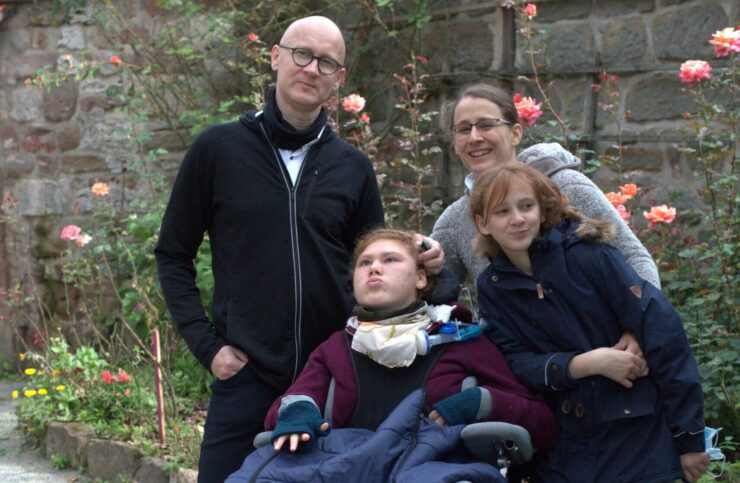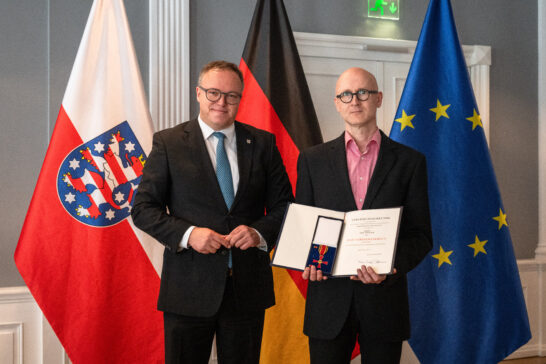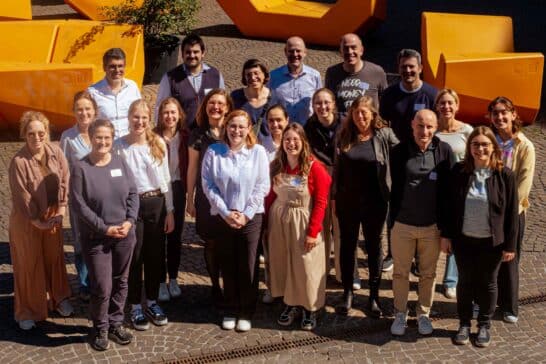„Finding your own way“
In this interview, pediatrician Nellie from Germany talks about the long journey to her daughter Linn’s diagnosis and her search for a path for her and her family.
Who is in your family?
Us parents – Dirk and Nellie, and our daughters Linn (*2004, PCH2A) and Ann (*2009).
How did your PCH2 journey start?
Initially, there was little knowledge about this disease available to us. The MRI scan found “olivopontocerebellar atrophy”. It was only through an internet forum that we later found out about another family with 2 out of 3 children affected by the condition. A former roommate, an aspiring human geneticist, finally gave us the diagnosis after we had sent him the letters and MRI images. The genetics part came later.
How did you feel during that time? What helped you and what was the most difficult?
The long period with no diagnosis was difficult. There was no prognosis, no information on how to treat this type of disability.
Those first years of constant restlessness, discontent, sleeplessness and without helpful ideas were very hard. How much I would have given to know that her stomach and esophagus were hurting and how to help her!
Linn couldn’t be taken anywhere at all, we were immobile and pretty much alone.
It helped to share our experiences on internet forums with other families with severely disabled children. We found practical advice and were feeling less alone.
Meeting the first other PCH family and suddenly talking about identical situations on the phone was amazing. The start of something great!
The diagnosis did so much for us: Exchange, new knowledge, prognosis, meeting all the other families we wouldn’t want to miss.
What are Linn’s symptoms? Have they changed over time?
Linn is unable to grasp, sit, stand or turn. Through us, she can get around in a wheelchair and there’s not much stopping us from going places either.
She is severely visually impaired and is considered blind.
She has treatment-resistant epilepsy, but we feel it is reasonable well treated. More medication would prevent her from participating in life enough. Although she has daily seizures, they do not cause her any suffering.
For a long time, Linn was only ventilated at night, but since the end of puberty she has been on ventilation almost 24 hours a day.
She has intestinal problems with constipation and flatulence. She also has endometriosis.
Her voiding dysfunction is relatively new, which is why regular catheterization is now necessary.
However, having tried and experienced so much, we would say that we can get most of it under control within hours or days, achieving a quality of life for her that is almost always good.
Which symptoms do you consider the most difficult for you and Linn?
Unclear pain and restlessness for which we cannot pinpoint a cause or offer a solution.
What helps you to manage your daily life as a family?
Our team of carers is a great addition to the family. Only together with them can we manage life with Linn at all. Many of the carers have been part of our team for years and we have a great deal of trust in them. They know Linn and her needs so well that we can go somewhere alone without having to worry. However, sometimes not all shifts can be filled due to the shortage of nursing staff.
Which tools would you not want to miss?
All of them: Wheelchair, nursing bed, respirator, hoist, stand-up trainer, inhalation device, vibrating vest, cough assist, orthoses.
What are the greatest challenges you face in daily life?
– The healthcare crisis and finding coverage for everyday care.
– Fighting with health insurance companies and government agencies. Fighting for sufficient disposables and a good supply of medical aids. Bureaucracy. Every year, another application for basic benefits, …
– Vacation options (hospice rarely possible, vacation with Linn only possible with care, vacation without Linn only possible with 24-hour home care service).
– Offering Linn enough exciting and engaging experiences in everyday life.
What does a “normal day” in your family look like?
The night shift hands Linn over to us at 6 a.m., we get her ready for the day and then hand her over to the morning shift at 7 a.m.
Linn has occupational therapy or physiotherapy at home at 8 a.m. and then leaves for the care center/sheltered workshop (special needs area) with the caregiver.
They return at 2:45 p.m. At this point, either we take over or someone from the afternoon shift looks after Linn until the night shift, takes her for a walk or does other activities.
At 6 p.m. it’s care time again, which includes taking her to the toilet, changing her clothes, washing her, putting her in the full-body orthosis and much more.
While care is being covered, we go to work, do household chores, schoolwork, volunteer work or deal with bureaucracy.
If the nursing staff are unavailable, which has become more frequent since the healthcare crisis, we cover those shifts ourselves, including night shifts.
Can you tell us about your favorite moments as a family?
Grandma’s 70th birthday, when everyone came to visit us and we spent the day together, topped off by a trip to Leuchtenburg Castle with a complete family photo where Linn just laughed. It’s usually very difficult to capture her laughter, even more so on a family photo. But we did it!
Linn’s birthday, which we spent in a spa, and we all got our money’s worth.
The summer, which we spend almost entirely on our terraces taking in the beauty of our neighborhood, while Linn enjoys the ribbons of her baby mobile playing in the wind, or the neighbors’ children playing, or the family chatter.
What has changed over time and how are you doing as a family today?
The first few years were very tough because we lacked quality of life for Linn. When we finally got the basics under control and had enough care relief in everyday life and on vacation, it became much better. Linn now laughs almost every day, while it used to take months for her to feel well enough to laugh.
On the other hand, 20 years of care with Linn growing bigger and more difficult to handle, as well as the increasing equipment needs, crises and bureaucratic battles, bring with them a lot of stress and questions about the future.
Is there anything you would like to wish for your PCH2 child?
Lots of joy, exciting experiences and special moments in everyday life, all without any physical discomfort.
And more ways of communicating what the problem is so that we can solve it quickly.
And always having great people by her side who can do what she can’t, but needs.
Why is Linn someone really special?
Linn easily wins people’s hearts when she gets the chance.
She communicates very clearly despite her severe disability and responds very positively.
She senses the mood of the people around her and reacts to it. She is always authentic.
What advice would you like to give to the parents of a child who has just been diagnosed with PCH2?
Life is not over! It will just be different than planned.
It is important to remember that a family consists of all its members and that not everything should and must revolve around this condition.
You are cordially invited to become part of the PCH family! I myself see this as a gift.
Remarks
You might think at first that the healthcare professionals know what’s going on and will show you the way. But it’s just like with normally developed children – every child is unique and there are many possible paths. In any case, a good medical team should always include opportunities for self-help and exchange. This will help you find your own way.
„Life is not over! It will just be different than planned.“
(Nellie)
Share your own story
to support and encourage other families on their journey.


